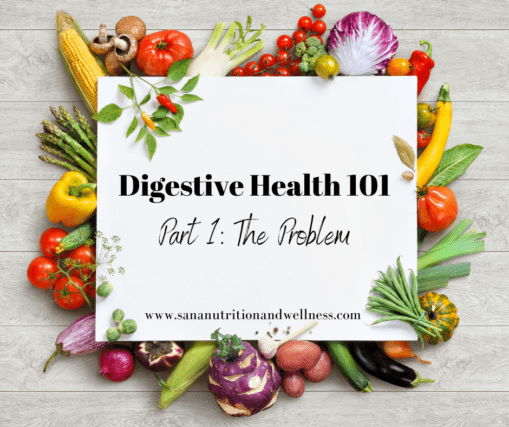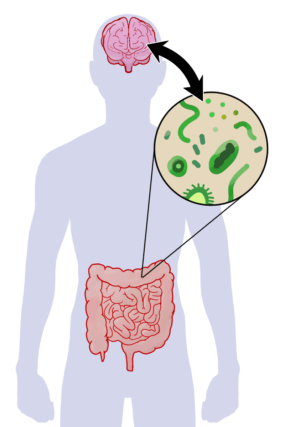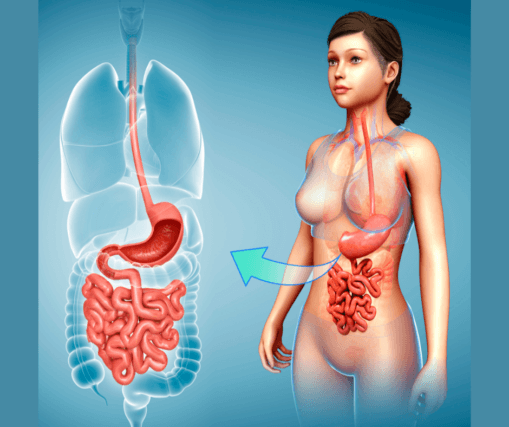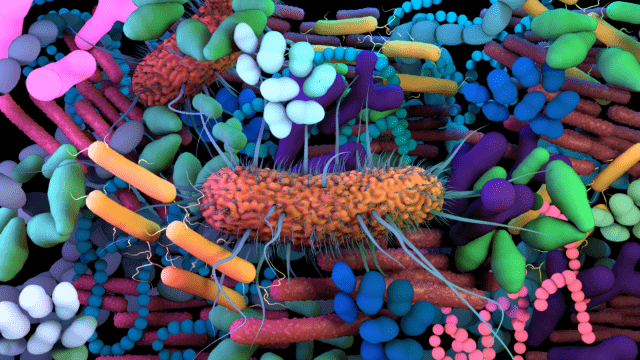
Ok, before I get started on the health journey we are about to embark on, let me just lay out the road map. I originally wrote Digestive Health 101 as one article, but it ended up being over 6 pages, single-spaced, 11 font-size…and ain’t no one got time for that!
I know you are busy with all the things, for all the people. And I want to be able to read and digest (pun intended) this information, so you can transform your health one probiotic-filled Kombucha at a time! So I broke this into 3 parts: The Problem, The Cause, and The Cure, to make it easier to consume.
So let’s jump right in…
Digestive Health 101: – The problem
Let’s start by talking about why your digestive health is so important, and to do that, let’s talk about your poop!
Yes, poop it’s very important.
In my opinion, we don’t talk about poop enough. Grandmas of old got it; they knew the importance of your daily BM. My dad tells a story about how his grandma, Nana Utley, constantly asked him about BM status and was very concerned if it wasn’t happening daily. He found this intrusive, but if he knew the importance of your poop and what it tells us about your health, he would have known how much she loved him and wanted him to be well.
My clients are always surprised about the amount I ask them about their poop. The frequency, the color, the size, the shape…you get the picture. I ask so much about their poop and digestion because I want to understand what is at the root of their health or weight concern, and it can often be traced back to digestive imbalance.
Many people have various degrees of digestive imbalance and upset, from constipation to loose stools, excess painful gas, heartburn, burping, and even frequent bouts of nausea or a combination of a few of these. Many people are diagnosed with IBS (irritable bowel syndrome), which is basically an umbrella diagnosis that means – “yes, you have these frequent and unpleasant symptoms, something is not right. So let’s treat those symptoms with some heartburn meds, laxatives, and maybe an anti-depressant and be on your way.” Not to go too deep into the “this is what’s wrong with conventional medicine these days,” but this IS what’s wrong with conventional medicine. If the treatment centers around symptom management and doesn’t actually deal with the root cause, you aren’t really solving anything, and you will see illness progress because most chronic disease ties back to gut health.
The Gastrointestinal (GI) tract is the root of our health. And that is why I start there first.
Why is our GI tract so crucial to our health?
Well, it’s pretty complex (hence the grueling long article), but I will try to make it as simple as possible. Our GI tract is a lovely ecosystem of microorganisms (bacteria, yeast, viruses (called bacteriophages), and fungi (yeast). All these organisms do many things for us, like digesting food, extracting and producing specific vitamins, synthesizing neurotransmitters, helping regulate immune function, communicating with our nervous system, maintaining the health and integrity of the cells of the GI tract, and so much more.
The gut is also referred to as the second brain because it has a complex network of neurons and neurotransmitters, and it’s directly connected to the brain via the vagus nerve. The vagus nerve is a long nerve that communicates with many of our organs as it passes between the brain and the GI tract, transmitting messages back and forth. So if there is dysfunction in the GI tract, this has a cascading effect throughout the body.
Let’s talk a little more about GI bacteria. The health of our GI tract relies on the health and balance of our GI bacteria. The bacteria in our gut are varied, and some are more beneficial than others. In a healthy system, there are more beneficial bacteria, keeping the “bad” ones in check and supporting the health of the GI tract itself. But unfortunately, our modern environment and western diet can easily throw off the balance of our ecosystem, causing Dysbiosis, which is when things start to go haywire.
Problems caused by Dysbiosis,
Causes Leaky Gut
Our colon is made up of cells that are tightly packed together. On one side of the cells is the inside of our tract, where our bacteria live. On the other side are immune cells and the blood vessels that carry nutrients (and other things) to and from the rest of the body. When our GI bacteria is not healthy, it doesn’t maintain the integrity of the walls and the tight junctions between cells, so the cells start to loosen and separate. And this separation allows food proteins like gluten to leak out of the colon and cause an immune reaction. Which causes food allergies, sensitivities, and low-grade chronic inflammation. Over time this chronic inflammation causes a cascade of damage through our body, most about this later.
Immune Disfunction
Ok, now once the stuff that is supposed to stay into the GI tract leaks out, it activates our immune system to do its thing. It recognizes proteins that aren’t supposed to be there and tags them as foreign, makes a note of them for the future, and destroys them. But the problem is that when it’s constantly detecting these proteins from our food that is leaking out, it’s happening regularly, causing chronic inflammation. This chronic inflammation is thought to be the underlying cause of many of our chronic health concerns. For example, heart disease (cholesterol is made in part to deal with inflammation), cancer, diabetes, eczema, neurological disease, mental health, and autoimmune diseases. (In an autoimmune disease, your own body starts attacking one of your organs or organ systems, like multiple sclerosis (MS), celiac disease, type 1 diabetes, and Hashimoto’s thyroiditis, to name a few.)
Vitamin and Mineral Deficiency
One of the essential functions of our little microbe buddies is their ability to extract, absorb and synthesize some vitamins and minerals from our food. So if we have an imbalance, we could become a deficit in some essential nutrients, and our body doesn’t have the vital cofactors it needs to function on a cellular level.
Other Conditions Linked to Dysbiosis
Because our GI bacteria has its fingers in all the pies (is that a good analogy? I am kind of a stream of consciousness writer, so I’m going with this it) of our health, so many chronic health conditions are linked to digestive health issues. Here are just a few and a simple explanation why.
- Obesity and Weight Gain – Some unhelpful bacteria actually impact hunger hormones grehin, changing your fullness and hunger cues. Some bacteria can also increase cravings for sugar, which they feed on. Finally, the inflammation linked to Dysbiosis increases stress hormones that increase glucose release from the liver, increasing insulin and causing weight gain and insulin resistance.
- Diabetes – A 2019 study showed that imbalance in the GI bacterial balance might contribute to the development of type 2 diabetes. And that certain bacterial strains (common in people who eat a Westernized diet) actually increase glucose intolerance, meaning you don’t handle changes in blood sugar, leading to increased insulin levels, which over time leads to insulin resistance, causing type 2 diabetes.
- Skin Condition like Exzema – Our skin is a barometer for inflammation, so in some p
 eople, chronic inflammation shows up as a distribution in the health and integrity of the skin, like in with eczema.
eople, chronic inflammation shows up as a distribution in the health and integrity of the skin, like in with eczema. - Neurological Diseases and Mental Health: This is a wide variety of conditions, from Autism and ADHD to Dementia, Alzheimer’s, and Parkinson’s to Mental Illness like Depression and Anxiety. The brain and nervous system are complex and still a mystery in many ways. Still, the role of the gut microbiota as a cofactor in the development of these diseases is becoming evident. Many studies have highlighted the bidirectional communication between the gut and brain, AKA “gut-brain axis,” Showing a link between changes in the gut microbiota composition and neurological, behavioral, and emotional symptoms in people with these conditions.
- Cardiovascular disease (CVD) – As discussed, our microbiome is a complex ecosystem that interacts with the immune system and influences so many inflammatory and metabolic pathways throughout the body. CVD, especially atherosclerosis, is thought to be caused by the interplay between blood lipids (cholesterol) and inflammation.
Ok, I know that was a lot! But I hope you understand a little better the importance of having a healthy GI microbiota. It’s is such a beautiful complex ecosystem with far-reaching impacts on all our body systems. So it’s essential to start here when you want to improve any aspect of your health.
This is just Part 1, to find our the Cause (Part 2) and the Cure (Part 3)…stay tuned; I will be releasing those articles soon!
And if you want to stay up to date with what I publish, sign up for my newsletter! HERE. You will get my Eat Well, Be Well Healthy Living Guide for free!







